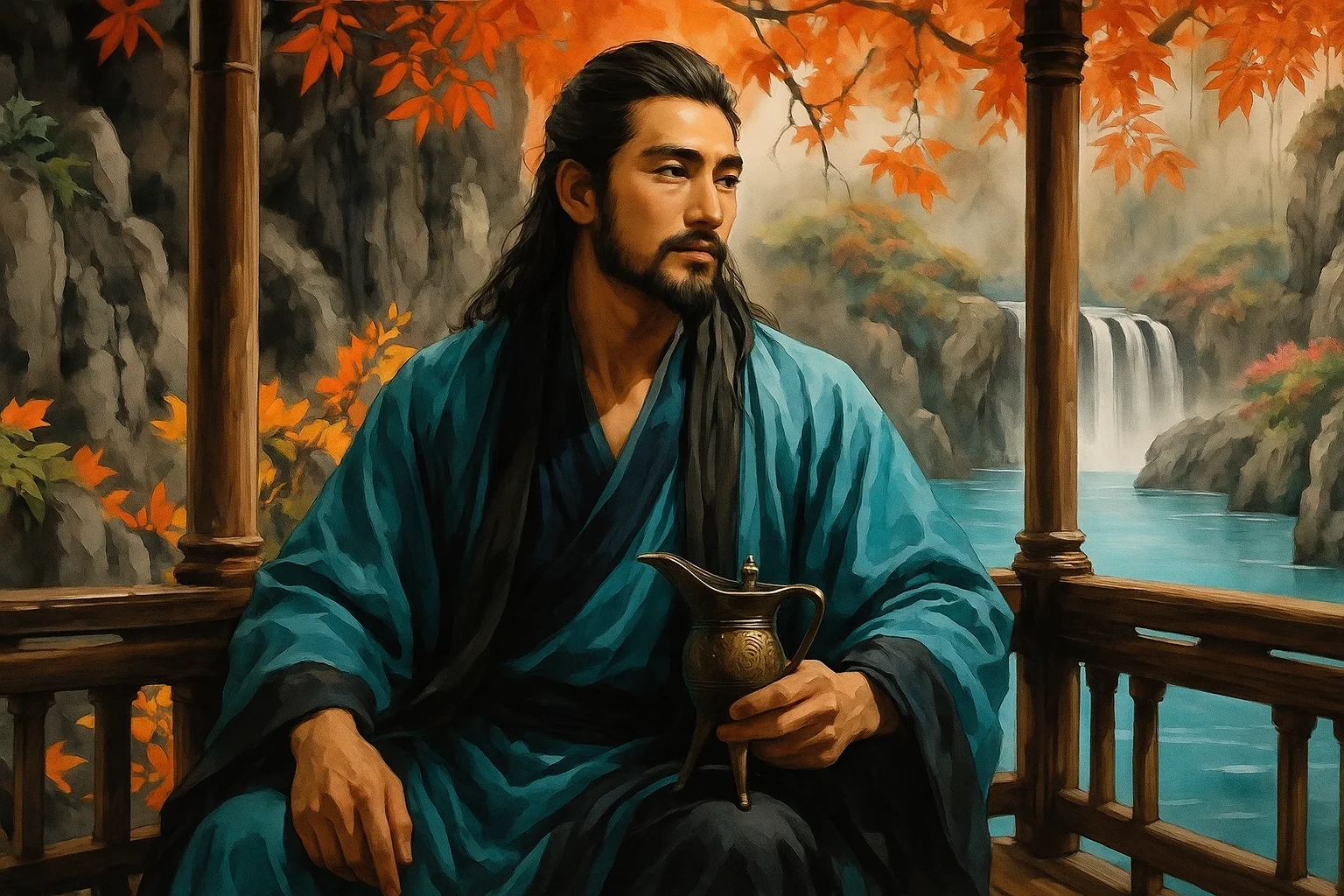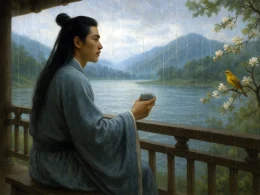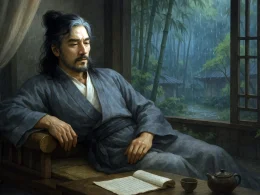A hundred longings, a thousand regrets—
Already wounded by spring’s parting,
How much more by spring wine’s frets!
The heartless man’s betrayal burns my heart.
When will I question him face to face, never to part?
My lovesick soul, an inch of flame,
Drunk or dreaming, still the same,
Finds no relief from this dull pain.
You doubt my love, though I swear it’s true.
Tears dry up, but grief will ever remain.
Original Poem
「蝶恋花 · 百种相思千种恨」
百种相思千种恨。
早是伤春,那更春醪困。
薄幸辜人终不忿。
何时枕畔分明问。懊恼风流心一寸。
欧阳修
强醉偷眠,也即依前闷。
此意为君君不信。
泪珠滴尽愁难尽。
Interpretation
Preserved in The Drunken Elder's Zither Pleasures, this lyric's composition period remains undated, though historical accounts attribute it to Ouyang Xiu's late career in Henan. Adopting a courtesan's voice, the work exemplifies his mature synthesis of folk directness and scholarly refinement - a poignant meditation on love's lingering wounds through seasonal melancholy.
First Stanza: "百种相思千种恨,早是伤春,那更春醪困。薄幸辜人终不忿,何时枕畔分明问。"
Bǎi zhǒng xiāng sī qiān zhǒng hèn, zǎo shì shāng chūn, nà gèng chūn láo kùn. Bó xìng gū rén zhōng bù fèn, hé shí zhěn pàn fēn míng wèn.
A hundred strains of longing, a thousand weights of blame— Spring's grief already hangs heavy, Now spring wine clouds my frame. That faithless soul still stokes my burning shame: When shall I face him awake, Pillow to pillow, all grievances to proclaim?
The stanza builds emotional pressure through accumulating metrics: the enumerative opening (百种/千种) quantifies overwhelming affect, while seasonal and alcoholic intensifiers (春醪困) compound the distress. The imagined pillow confrontation (枕畔分明问) vibrates with forensic intensity - the bed transforming into both courtroom and confessional.
Second Stanza: 懊恼风流心一寸,强醉偷眠,也即依前闷。此意为君君不信,泪珠滴尽愁难尽。
Ào nǎo fēng liú xīn yī cùn, qiáng zuì tōu mián, yě jí yī qián mèn. Cǐ yì wèi jūn jūn bù xìn, lèi zhū dī jìn chóu nán jìn.
Regret consumes this heart once swift to passion's call— Compelled intoxication, stolen repose, Yet the ancient gloom persists through all. "This heart treasures you alone" - you won't recall, Though tears drain their sacred spring, The sorrow won't cease, won't stall.
Here the body becomes an arena of failed remedies: alcohol (强醉) and sleep (偷眠) prove powerless against entrenched melancholy. The physiological metaphor - tears as a depleted sacred spring (泪珠滴尽) while sorrow's aquifer remains full - inverts conventional catharsis, suggesting authentic grief transcends physical limits. The closing repetition (won't cease, won't stall) enacts the very persistence it describes.
Holistic Appreciation
This lyric poem, narrated in a woman’s voice, brims with raw and poignant emotion. The first stanza uses spring scenery and spring wine as conduits to evoke deep resentment and longing for a lover, while the second stanza shifts from regret to melancholy, revealing the internal tug-of-war and emotional turbulence. The poem’s emotional layers are particularly rich—intertwining sorrow, resentment, frustration, remorse, and an ineffable mix of obsession and lingering attachment.
Dense with imagery like "lovesickness," "resentment," "grief for spring," "spring wine," "forced drunkenness," and "falling tears," the poem unfolds its emotional expression from multiple angles, striking an immediate chord with readers. This complex yet restrained portrayal of feeling is quintessential Song lyricism. The most moving moment arrives in the closing line: "Tears may dry, but sorrow never ends," which crescendos the poem’s emotional arc—using the exhaustion of tears to convey the boundlessness of love’s torment, leaving an enduring resonance.
Artistic Merits
The poem’s most striking feature is its rich emotional layering and authentic delicacy. Through classic wanyue (婉约) diction and emotional progression, the poet meticulously renders a devoted woman’s inner turmoil of love and resentment. Structurally, it adopts a "first stanza: present reality; second stanza: psychological depth" framework, guiding the expression from external to internal, tangible to abstract.
Linguistically, it excels in parallelism and repetition, as seen in lines like "a hundred kinds of longing, a thousand kinds of regret" and "tears may dry, but sorrow never ends," which amplify both semantic richness and rhythmic impact. Additionally, the poem adopts a feminine voice to depict love’s betrayal, intensifying empathy through role immersion—a hallmark of Ouyang Xiu’s romantic lyricism.
Insights
This poem portrays a woman trapped in unrequited love, each word blood-stained, each line heavy with sighs. It reminds us that while emotions are beautiful, they can also ensnare; deep affection, though precious, becomes pain when unanswered. Yet literature’s power lies in transforming personal anguish into shared catharsis, elevating individual suffering into timeless art.
The poem also reveals that Song lyrics are not merely about moonlit breezes—they can profoundly reflect human nature, emotion, and psychology. Though a statesman and literatus, Ouyang Xiu crafts such heart-wrenching verses, proving that profound feeling belongs to no single class or gender. It is universal—worthy of tender observation and expression.
About the Poet

Ouyang Xiu (欧阳修, 1007 - 1072), a native of Yongfeng, Jizhou (present-day Jiangxi Province), emerged as the preeminent literary figure of the Northern Song Dynasty. After attaining the jinshi degree in 1030, he spearheaded a literary reform movement that rejected the ornate Xikun style prevalent at court. As a mentor who nurtured literary giants like Su Shi and Zeng Gong, he laid the foundation for the golden age of Northern Song literature. Recognized as one of the "Eight Great Prose Masters of Tang and Song," Ouyang stands as the pivotal figure in the transformation of Northern Song literary culture.












